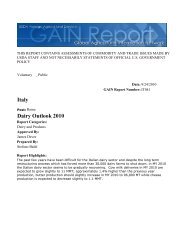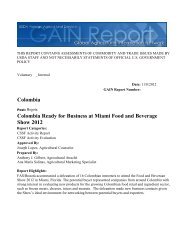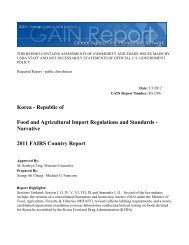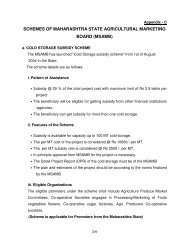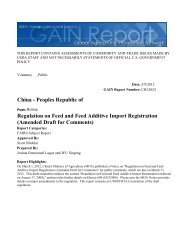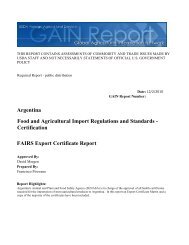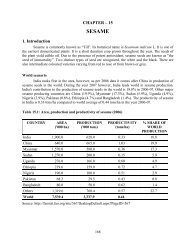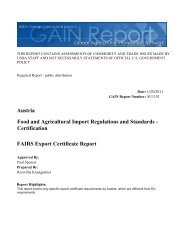Report of the Joint Study Group on the Feasibility of India-Indonesia ...
Report of the Joint Study Group on the Feasibility of India-Indonesia ...
Report of the Joint Study Group on the Feasibility of India-Indonesia ...
You also want an ePaper? Increase the reach of your titles
YUMPU automatically turns print PDFs into web optimized ePapers that Google loves.
41<br />
Branches and Liais<strong>on</strong> Offices can perform <strong>on</strong>ly specified functi<strong>on</strong>s and for undertaking o<str<strong>on</strong>g>the</str<strong>on</strong>g>r<br />
activities a Company has to be incorporated under <str<strong>on</strong>g>the</str<strong>on</strong>g> <strong>India</strong>n Companies Act, 1956.<br />
III.3.1.9. Acquisiti<strong>on</strong> and Transfer <str<strong>on</strong>g>of</str<strong>on</strong>g> Immovable Property in <strong>India</strong> for Carrying On a<br />
Permitted Activity<br />
A foreign investor who establish a Company or a branch, excluding a liais<strong>on</strong> <str<strong>on</strong>g>of</str<strong>on</strong>g>fice, can<br />
acquire immovable property in <strong>India</strong> which is necessary for or incidental to carrying <strong>on</strong> his<br />
business activity in <strong>India</strong> subject to compliance with all applicable laws and reporting to <str<strong>on</strong>g>the</str<strong>on</strong>g><br />
Reserve Bank <str<strong>on</strong>g>of</str<strong>on</strong>g> <strong>India</strong> within ninety days from <str<strong>on</strong>g>the</str<strong>on</strong>g> date <str<strong>on</strong>g>of</str<strong>on</strong>g> such acquisiti<strong>on</strong>.<br />
III.3.2. Ind<strong>on</strong>esia<br />
On 26 April 2007 with <str<strong>on</strong>g>the</str<strong>on</strong>g> joint approval <str<strong>on</strong>g>of</str<strong>on</strong>g> <str<strong>on</strong>g>the</str<strong>on</strong>g> Ind<strong>on</strong>esian Parliament and <str<strong>on</strong>g>the</str<strong>on</strong>g> President <str<strong>on</strong>g>of</str<strong>on</strong>g><br />
<str<strong>on</strong>g>the</str<strong>on</strong>g> Republic <str<strong>on</strong>g>of</str<strong>on</strong>g> Ind<strong>on</strong>esia Susilo Bambang Yudhoy<strong>on</strong>o, a new Law <strong>on</strong> Investment was<br />
enacted. This new Investment Law replaced <str<strong>on</strong>g>the</str<strong>on</strong>g> old Foreign Investment Law <str<strong>on</strong>g>of</str<strong>on</strong>g> 1967 and <str<strong>on</strong>g>the</str<strong>on</strong>g><br />
Domestic Investment Law <str<strong>on</strong>g>of</str<strong>on</strong>g> 1968, because <str<strong>on</strong>g>the</str<strong>on</strong>g>se two latter Laws no l<strong>on</strong>ger suited <str<strong>on</strong>g>the</str<strong>on</strong>g><br />
necessity to accelerate Ind<strong>on</strong>esia’s nati<strong>on</strong>al ec<strong>on</strong>omic and legal development, especially<br />
regarding investment. The specific c<strong>on</strong>siderati<strong>on</strong>s underlying this new Investment Law were<br />
that to accelerate nati<strong>on</strong>al ec<strong>on</strong>omic development, it was necessary to increase both domestic<br />
as well as foreign investment. To this end, it was necessary to create an investment climate<br />
which is c<strong>on</strong>ducive, promoti<strong>on</strong>al, legally certain, impartial and efficient, while taking into<br />
account <str<strong>on</strong>g>the</str<strong>on</strong>g> interest <str<strong>on</strong>g>of</str<strong>on</strong>g> <str<strong>on</strong>g>the</str<strong>on</strong>g> nati<strong>on</strong>al ec<strong>on</strong>omy.<br />
This Law includes all direct investment activities in all sectors. While domestic investment<br />
may take <str<strong>on</strong>g>the</str<strong>on</strong>g> form <str<strong>on</strong>g>of</str<strong>on</strong>g> a corporati<strong>on</strong>, n<strong>on</strong>-corporati<strong>on</strong> or individual business, foreign<br />
investment projects should be in <str<strong>on</strong>g>the</str<strong>on</strong>g> form <str<strong>on</strong>g>of</str<strong>on</strong>g> a limited liability company based <strong>on</strong> <str<strong>on</strong>g>the</str<strong>on</strong>g> law <str<strong>on</strong>g>of</str<strong>on</strong>g><br />
<str<strong>on</strong>g>the</str<strong>on</strong>g> Republic <str<strong>on</strong>g>of</str<strong>on</strong>g> Ind<strong>on</strong>esia.<br />
A major difference with <str<strong>on</strong>g>the</str<strong>on</strong>g> two old investment laws is that <str<strong>on</strong>g>the</str<strong>on</strong>g> new Investment Laws<br />
provides nati<strong>on</strong>al treatment that is it provides equal treatment to any investors from all<br />
countries as it provides to domestic investors. However, <str<strong>on</strong>g>the</str<strong>on</strong>g> principle <str<strong>on</strong>g>of</str<strong>on</strong>g> same treatment shall<br />
not apply to investors from certain countries that have received privileges by virtue <str<strong>on</strong>g>of</str<strong>on</strong>g> an<br />
agreement with Ind<strong>on</strong>esia.<br />
The new Investment Law provides a guarantee that <str<strong>on</strong>g>the</str<strong>on</strong>g> Ind<strong>on</strong>esian government shall nei<str<strong>on</strong>g>the</str<strong>on</strong>g>r<br />
nati<strong>on</strong>alize nor take over <str<strong>on</strong>g>the</str<strong>on</strong>g> ownership rights <str<strong>on</strong>g>of</str<strong>on</strong>g> investors, except through <str<strong>on</strong>g>the</str<strong>on</strong>g> law. In <str<strong>on</strong>g>the</str<strong>on</strong>g>



